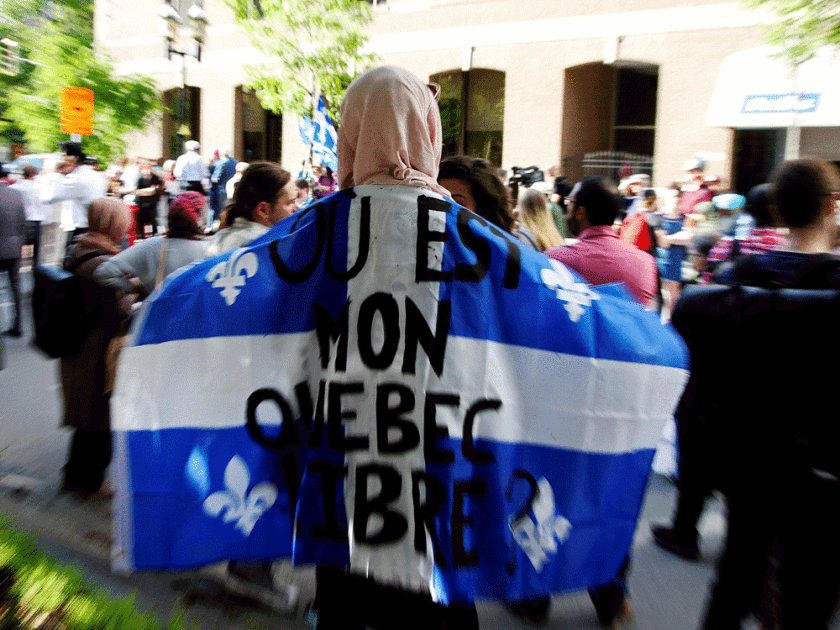The idea that Bill 21 a 'provincial issue' is rather belied by the fact Trudeau is running his campaign as much against Doug Ford's policies as he is against Scheer
Quebec’s Bill 21, which bans civil servants in certain positions of authority from wearing religious symbols on the job, passed in the National Assembly in June. And Quebecers are now gradually getting to know the victims of their pseudo-secularist misadventure — and what they intend to do about it.
Amrit Kaur, a 28-year-old recent teachers’ college graduate who wears a turban, has been in the news recently after picking up stakes for Surrey, B.C. Chahira Battou, a 29-year-old teacher who wears a hijab, was the subject of a similar news cycle back in April, telling various outlets she would rather be fired than obey the law — “If I submit to the law, and I remove my scarf when I go to teach, that is when I become a submissive woman,” she told the Washington Post — and rilingnationalist commentators when she suggested to TVA host Denis Lévesque that Quebec cannot be a country of laïcité, because it isn’t a country at all. Nadia Naqvi, another teacher who wears the hijab, told the Post she wouldn’t take off her hijab out of respect for her students: “We’re supposed to teach them to stand up for their beliefs.” (Already-employed civil servants are not officially affected by Bill 21 unless they are so presumptuous as to want a promotion.)
Most of those affected will be teachers, most women, and most — not by accident — Muslim. But not all. Sondos Lamrhari is reportedly the first hijab-wearing Quebecer to study police tech, and hopes to apply to the Montreal or Laval police force in the near future. Not far behind her is 15-year-old Sukhman Singh Shergill, who has dreamed his whole life of being a police officer. His cousin, Gurvinder Singh, was part of a successful campaign at the New York City Police Department to allow officers to wear turbans and beards on the job, and Shergill has already started his own campaign in Montreal.
We will meet more and more of these people in coming months and years, and it will quickly demonstrate that Premier François Legault’s stated goal in passing Bill 21 — to put the issue to bed — will not be achieved.
In the meantime, every federal party leader has strongly opposed the law. Prime Minister Justin Trudeau has called the restrictions “unthinkable.” “A society based on fundamental freedoms and openness must always protect fundamental individual rights and should not in any way impede people from expressing themselves,” Conservative leader Andrew Scheer told reporters in Quebec City in March. NDP leader Jagmeet Singh, a criminal lawyer who could not work as a Crown attorney in Quebec by dint of his turban, has correctly argued that “there are a lot of people in Quebec who don’t feel this is the right way to go,” and is gamely auditioning to “be their champion.”
If Alberta had instituted Bill 21, we would be looking at a very different federal campaign
That being the case, it’s no surprise the issue has been totally absent from federal election discussions. All three major parties agree the ban is wrong; all of them want the votes of people who support the ban; and no one wants the Bloc Québécois to leverage federalist/non-francophone opposition into renewed relevance.
A braver person than me might call this a victory for federalism. As consumed as Quebec has been for 15 years in the reasonable accommodations debate, Éric Grenier’s poll tracker at CBC has the Bloc at just 18.5 per cent, the Conservatives at 23 per cent, and the Liberals — led by Canada’s most ardent multiculturalist, son of the fiend who foisted multiculturalism upon Quebec in the first place — leading at 35 per cent.
The poor NDP, which under Jack Layton squashed the Bloc in 2011, languishes at 11 per cent, not even two points clear of the Greens. But the other parties have in essence adopted the Sherbrooke Declaration principles that helped Layton appeal to soft Quebec nationalists: In exchange for abandoning separatism Quebec gets, if not every single thing it wants, then very asymmetrical treatment indeed — not just in substance, but in political rhetoric.
Bill 21 is stretching that compromise right to the breaking point, however. The idea that Quebec’s restrictions on minority rights are a “provincial issue,” and that this explains their absence from the federal scene, is rather belied by the fact that Trudeau is running his campaign as much against Ontario Premier Doug Ford and his various budget cuts as he is against Scheer. If Alberta had instituted Bill 21 — which it wouldn’t, but if it had — we would be looking at a very different federal campaign. Liberals would hold it up as evidence of shameful, intolerable intolerance, and they would have a point.
Can it really be a purely “provincial issue” when a government uses Section 33 of the Canadian Charter of Rights and Freedoms to impose restrictions on minority rights that the prime minister considers “unthinkable”? What’s the point of national unity if it means keeping shtum on such a fundamental question of individual rights and freedoms? Federal leaders utterly deplore the restrictions — fine. Voters should ask them what exactly they intend to do about them.
• Email: cselley@nationalpost.com | Twitter: cselley



























